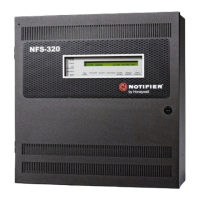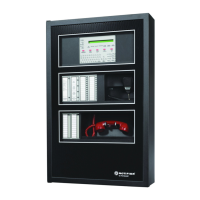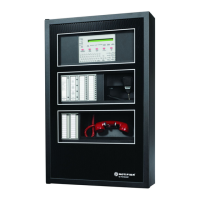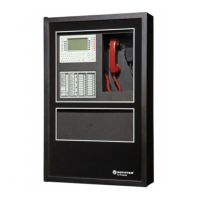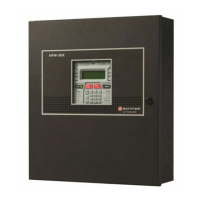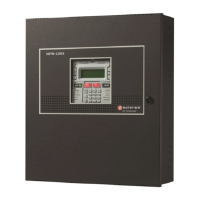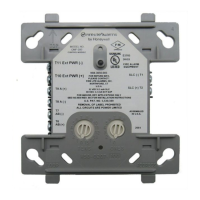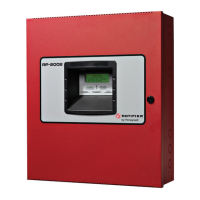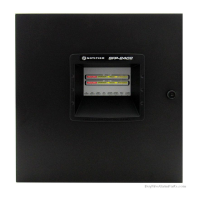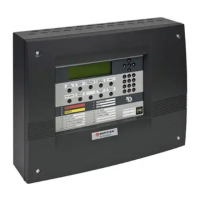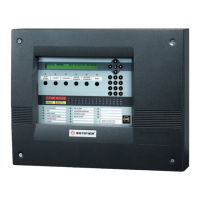NFS-320/E/C Operations Manual —NFS-320/E/C Operations Manual —
Fire Alarm System LimitationsFire Alarm System Limitations
While a fire alarm system may lower insurance rates, it is not a substitute for fire insurance!While a fire alarm system may lower insurance rates, it is not a substitute for fire insurance!
An automatic fire alarm systemAn automatic fire alarm system
—typically made up of—typically made up of
smoke detectors, heat detectors, manual pull stations, audiblesmoke detectors, heat detectors, manual pull stations, audible
warning devices, and a fire alarm control panel with remotewarning devices, and a fire alarm control panel with remote
notification capability—can provide early warning of a notification capability—can provide early warning of a
Such a system, howeverSuch a system, however
, does not assure , does not assure
against property damage or loss of life resulting from a fire.against property damage or loss of life resulting from a fire.
The Manufacturer recommends that smoke and/or heat detec-The Manufacturer recommends that smoke and/or heat detec-
tors be located throughout a protected premise following thetors be located throughout a protected premise following the
recommendations of the current edition of the National Firerecommendations of the current edition of the National Fire
Protection Association Standard 72 (NFPA 72), manufacturer'sProtection Association Standard 72 (NFPA 72), manufacturer's
recommendations, State and local codes, and the recommendations, State and local codes, and the
dations contained in the Guide for Proper Use of Systemdations contained in the Guide for Proper Use of System
Smoke Detectors, which is made available at no charge to allSmoke Detectors, which is made available at no charge to all
installing dealers. installing dealers.
A study by the A study by the
Federal Emergency Man-Federal Emergency Man-
agement Agency (an agency of the United States government)agement Agency (an agency of the United States government)
indicated that smoke detectors may not go off in as many asindicated that smoke detectors may not go off in as many as
35% of all fires. 35% of all fires.
While fire alarm systems are designed to pro-While fire alarm systems are designed to pro-
vide early warning against fire, they do not guarantee warningvide early warning against fire, they do not guarantee warning
or protection against fire. or protection against fire.
A fire alarm system may not provideA fire alarm system may not provide
timely or adequate warning, or simply may not function, for atimely or adequate warning, or simply may not function, for a
variety of reasons:variety of reasons:
Smoke detectorsSmoke detectors
may not sense fire where smoke cannotmay not sense fire where smoke cannot
reach the detectors such as in chimneys, in reach the detectors such as in chimneys, in
or behind walls, onor behind walls, on
roofs, or on the roofs, or on the
other side of closed other side of closed
Smoke detectorsSmoke detectors
also may not sense a fire on another level also may not sense a fire on another level
or floor of a building.or floor of a building.
A second-floor detector, for example, may not sense a first-A second-floor detector, for example, may not sense a first-
floor or basement fire.floor or basement fire.
Particles of combustion or “smoke”Particles of combustion or “smoke”
from a developing firefrom a developing fire
may not reach the sensing chambers of smoke detectorsmay not reach the sensing chambers of smoke detectors
chimneys may inhibit particle or chimneys may inhibit particle or
the ceiling or upper walls where detectors are located.the ceiling or upper walls where detectors are located.
reaching the detector.reaching the detector.
The amount of “smoke” present may be insufficient to alarmThe amount of “smoke” present may be insufficient to alarm
smoke detectors. smoke detectors.
Smoke detectors are designed Smoke detectors are designed
various levels of smoke densityvarious levels of smoke density
If such density levels are notIf such density levels are not
created by a developing fire at the location of detectors, thecreated by a developing fire at the location of detectors, the
detectors will not go into alarm.detectors will not go into alarm.
Smoke detectors, even when Smoke detectors, even when
working properly, have sensingworking properly, have sensing
limitations. limitations.
Detectors that Detectors that
have photoelectronic have photoelectronic
chambers tend to detect smoldering fires better than flamingchambers tend to detect smoldering fires better than flaming
fires, which have little visible fires, which have little visible
Detectors that have ion-Detectors that have ion-
izing-type sensing chambers tend to detect fast-flaming firesizing-type sensing chambers tend to detect fast-flaming fires
better than smoldering fires. better than smoldering fires.
Because fires develop in Because fires develop in
ways and are often unpredictable in their growth, neither typeways and are often unpredictable in their growth, neither type
of detector is necessarily best and a given type of detectorof detector is necessarily best and a given type of detector
may not provide adequate warning of a fire.may not provide adequate warning of a fire.
Smoke detectors cannot be expected to provide adequateSmoke detectors cannot be expected to provide adequate
warning of fires caused by arson, children playing withwarning of fires caused by arson, children playing with
matches (especially in bedrooms), smoking in bed, and violentmatches (especially in bedrooms), smoking in bed, and violent
explosions (caused by escaping gas, improper storage ofexplosions (caused by escaping gas, improper storage of
flammable materials, etc.).flammable materials, etc.).
Heat detectorsHeat detectors
do not sense particles of combustion anddo not sense particles of combustion and
alarm only when heat on their sensors increases at a predeter-alarm only when heat on their sensors increases at a predeter-
mined rate or mined rate or
reaches a predetermined reaches a predetermined
heat detectors may be subject to reduced sheat detectors may be subject to reduced s
ensitivity over time.ensitivity over time.
For this reason, the rate-of-rise feature of each detectorFor this reason, the rate-of-rise feature of each detector
should be tested at least once per year by a qualified fire pro-should be tested at least once per year by a qualified fire pro-
tection specialist. tection specialist.
Heat detectors are Heat detectors are
property, not life.property, not life.
must be installed in themust be installed in the
same room as the control panel and in rooms used same room as the control panel and in rooms used
tem for the connection of alarm transmission wiring, communi-tem for the connection of alarm transmission wiring, communi-
cations, signaling, and/or pcations, signaling, and/or p
If detectors are not soIf detectors are not so
located, a developing fire may damage the alarm system, crip-located, a developing fire may damage the alarm system, crip-
pling its ability to report a fire.pling its ability to report a fire.
Audible warning devicesAudible warning devices
such as bells may not alert peoplesuch as bells may not alert people
if these devices are located on the other side of closed orif these devices are located on the other side of closed or
partly open doors or are located on another floor of a building.partly open doors or are located on another floor of a building.
Any warning device may fail to alert people with a disability orAny warning device may fail to alert people with a disability or
those who have recently consumed drugs, alcohol or medica-those who have recently consumed drugs, alcohol or medica-
in people with conditions such in people with conditions such
hear a fire alarm signal, do not hear a fire alarm signal, do not
respond or comprehend therespond or comprehend the
meaning of the signmeaning of the sign
It is the property It is the property
owner's responsi-owner's responsi-
bility to conduct fire drills and other training exercise tobility to conduct fire drills and other training exercise to
make people aware of fire alarm signals and instruct themmake people aware of fire alarm signals and instruct them
on the proper reaction to alarm signals.on the proper reaction to alarm signals.
cause temporary or permanent hearing loss.cause temporary or permanent hearing loss.
A fire alarm systemA fire alarm system
will not operate without any electricalwill not operate without any electrical
If AC power fails, the system will If AC power fails, the system will
operate from standbyoperate from standby
batteries only for a specified time and only if the batteries havebatteries only for a specified time and only if the batteries have
been properly maintained and been properly maintained and
replaced regularly.replaced regularly.
Equipment used in the systemEquipment used in the system
may not be technically com-may not be technically com-
patible with the control panel. patible with the control panel.
It is essential to use only equip-It is essential to use only equip-
ment listed for service with your control panel.ment listed for service with your control panel.
Telephone linesTelephone lines
needed to transmit alarm signals from aneeded to transmit alarm signals from a
premise to a central monitoring station may be out of servicepremise to a central monitoring station may be out of service
or temporarily disabled. For added protection against tele-or temporarily disabled. For added protection against tele-
phone line failure, backup radio transmission systems are rec-phone line failure, backup radio transmission systems are rec-
The most common causeThe most common cause
of fire alarm malfunction is inade-of fire alarm malfunction is inade-
quate maintenance. quate maintenance.
o keep the entire fire alarm system ino keep the entire fire alarm system in
excellent working order, ongoing maintenance is required perexcellent working order, ongoing maintenance is required per
the manufacturer's recommendations, and UL and NFPA stan-the manufacturer's recommendations, and UL and NFPA stan-
At a minimum, the requirements of NFPAt a minimum, the requirements of NFP
A 72 shall beA 72 shall be
Environments with large Environments with large
amounts of dust, dirt amounts of dust, dirt
high air velocity high air velocity
require more frequent marequire more frequent ma
tenance agreement should be arranged through the local man-tenance agreement should be arranged through the local man-
ufacturer's representative. ufacturer's representative.
Maintenance should Maintenance should
monthly or as required by National and/or local fire codes andmonthly or as required by National and/or local fire codes and
should be performed by authorized professional fire alarmshould be performed by authorized professional fire alarm
installers onlyinstallers only
Adequate written records Adequate written records
of all inspectionsof all inspections
should be kept.should be kept.
Limit-C-9-2005Limit-C-9-2005
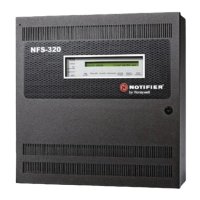
